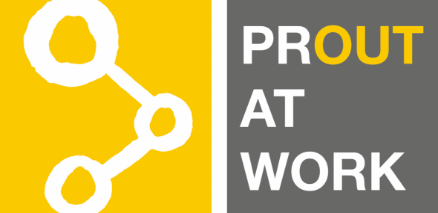
MYSTORY with …
Mano
Berlin
“To Tell the truth, I never came out because i was never hidden in the closet.”
Published: October 2023
There are certainly a multitude of people and events that have marked, educated, shocked and inspired me. My parents and my family are my primary role models. Fortunately, they tought me essential basics such as courage, respect and humility. They nurtured the roots on which I can grow. My parents certainly knew about my homosexuality before me, but they never asked me the question. Out of modesty, fear or respect, I don’t know. Anyway, I like to think it’s out of love. To tell the truth, I never came out because I was never hidden in the closet.
I knew at a very young age that I was different from others, by my physical appearance, my origins and also my attraction to boys.
I am very lucky to have a loving and respectful family. I would like other less fortunate people to access better possibilities.
Today as Doctor of Pharmacy I work at Parexel International as project director for compassionate programs. These programs provide patients with serious or life-threatening conditions access to unapproved products when no comparable alternative treatment options exist – while ensuring patient safety and superior delivery.
I identify as queer and believe that a diverse, equitable and inclusive world leads to better outcomes for and with everyone. It expands access to better health care, creates opportunities and expands human rights for traditionally underrepresented patient groups.
Most if not all clinical trials focus on male/female behaviors against drugs for purposes of safety and efficacy and to better dose patients. Failure to collect gender identity information means that there may be certain diseases, conditions and risk factors that we are not aware of. Unfortunately, traditional study structures, the templates we use for protocols and informed consent documents, and the data we collect are often designed in ways that do not address the specific needs and demographics of the transgender community.
Our priority commitment to patients must motivate us to recruit a diverse group of patients that represent our society. Indeed, we develop methods, trainings and documents to promote and improve the enrollment of LGBT*IQ patients in clinical drug trials and compassionate programs. There is a need to educate healthcare professionals to encourage diverse patients to participate in clinical trials, including transgender and non-binary people.
We need trust and respect of transgender and non-binary communities towards their healthcare professional in the context of clinical research.
DEAR mano, Thank you very much for YourStory!
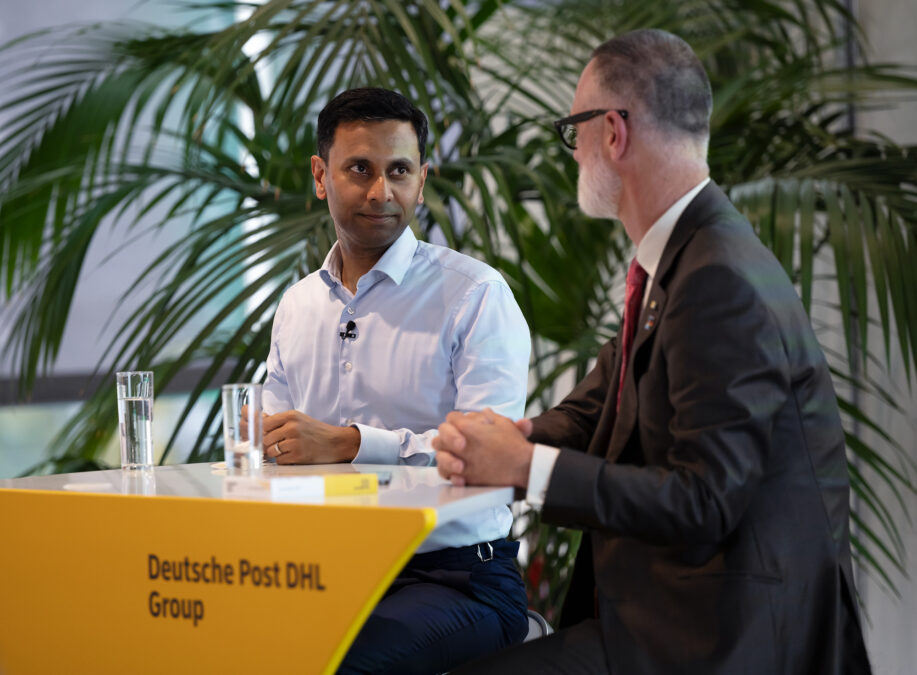
DR. SHIVAJI DASGUPTA
“HAVING THE FREEDOM TO BE WHO YOU ARE GIVES YOU SO MUCH MORE AGENCY AND ALLOWS FOR SO MUCH HIGHER PRODUCTIVITY BECAUSE YOU DON’T HAVE TO HIDE ANYTHING.”
Many people think that sexual or gender identity has no place in the workplace and therefore does not need to be discussed. But the truth is different – the hiding of LGBT*IQ employees who are not outed is often at the expense of team spirit, energy and motivation in the workplace and limits the productivity of these people immensely. For this reason, it is important to create an “open and inclusive corporate culture that supports all employees in using their full potential to achieve the company’s goals.” – says Albert Kehrer, Chairman of the PROUT AT WORK Foundation. To get one step closer to this goal, this year’s DINNER BEYOND BUSINESS keynote speaker – Dr. Shivaji Dasgupta – provided powerful insights into his world as an out executive during a “Fireside Chat” and highlighted the importance of commitment to LGBT*IQ equal opportunities on the part of companies.
At the PROUT AT WORK Foundation’s 6th DINNER BEYOND BUSINESS, hosted by Deutsche Post DHL Group in Bonn, the focus was on the commitment of companies and their leaders to the LGBTIQ community. “We are all united tonight by the desire for people to be able to come to the workplace with their authentic selves and not have to hide a significant part of their personality.” – said Dr. Thomas Ogilvie, Member of the Board of Management and Labor Director of Deutsche Post DHL Group in his welcoming speech. More than 35 senior executives from major companies and institutions accepted the invitation, including representatives from BASF, Clifford Chance, Continental, Commerzbank, Ergo, IKEA, ING Diba, NTT Data, Oracle, Otto, Robert Bosch, Sandoz, Sodexo and UniCredit. In the immediate vicinity of the Rhine, the participants of the top-class information and networking event enjoyed an exclusive dinner. Albert Kehrer explained the background of DINNER BEYOND BUSINESS in his welcoming speech: “We believe that there is a business case behind the support for LGBTIQ: an individual one for the people who come out, but also on a corporate level – whether B2B or B2C.” The highlight of the evening was the “Fireside Chat” by the CEO of the host PROUT AT WORK Foundation, together with keynote speaker Dr. Shivaji Dasgupta, Out Executive and Chief Data Officer at Unicredit on diversity, responsibility and leading by example.
“People then know they can trust you on other issues as well – you get an added bonus of trust as a leader if you’re completely open and honest.”
At the beginning of the 45-minute talk, Dasgupta shared private insights as an out executive: “99% of the reactions to my coming out have been overwhelmingly positive. Having the freedom to be who you are gives you so much more agency, and allows for so much higher productivity because you don’t have to hide anything.” At the same time, it has a clear impact on the professional environment: “People then know they can trust you on other issues – you get an extra trust bonus as a leader if you’re completely open and honest.” According to Dasgupta, companies also benefit considerably from their commitment to LGBT*IQ equal opportunities, whether through better results due to more diverse teams or when recruiting talented employees.
“Executive Allies are so important because they send a very strong signal throughout the organization that discriminatory behavior will not be tolerated.”
Also highlighted in the “Fireside Chat” was the influence of Allies: “Executive Allies are so important because they send a very strong signal in the organization that discriminatory behavior will not be tolerated.” Against the backdrop of different legal realities for LGBT*IQ around the world, the Indian-born executive is also concerned about valuing and taking advantage of freedoms here:
“We should all feel fortunate to be where we are and take this opportunity to help others.”
Drawing of the talk with DR. SHIVAJI DASGUPTA
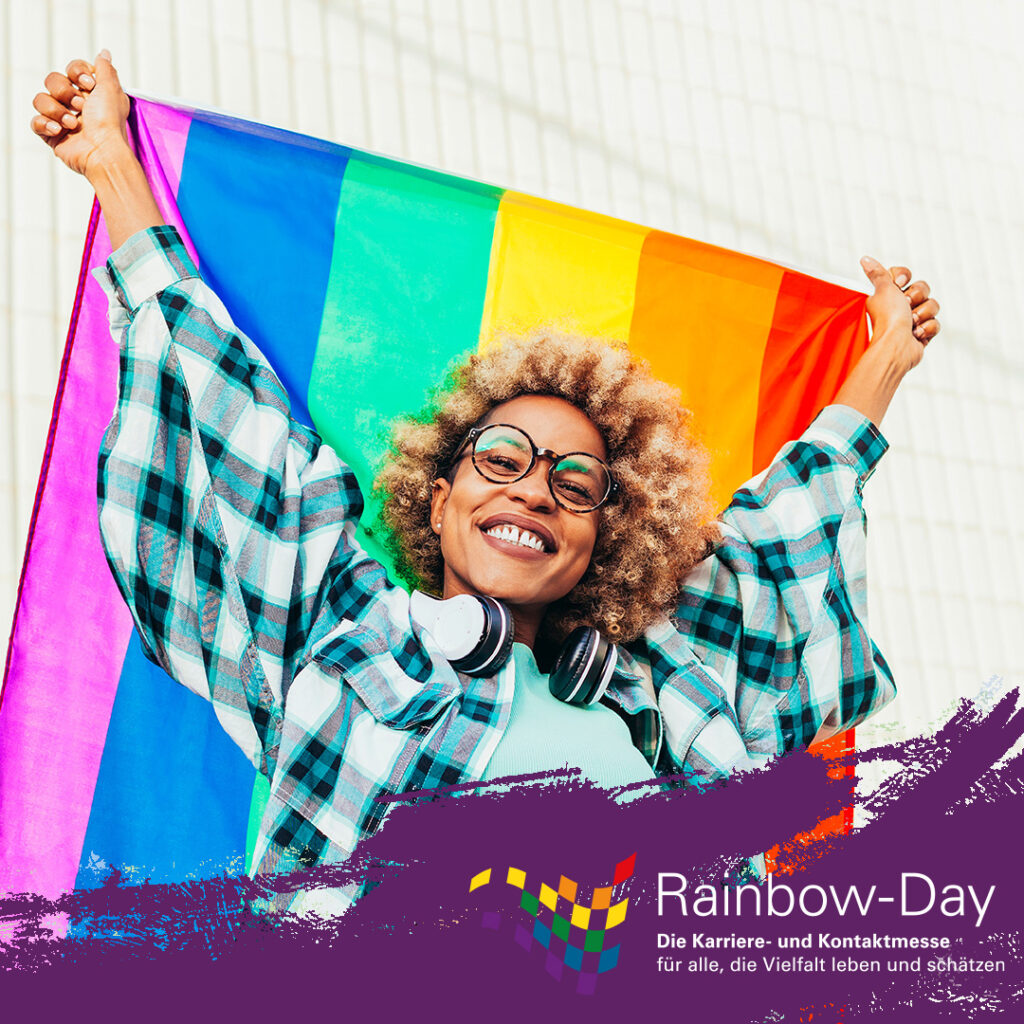
We are happy to be part of the first Rainbow Day on July 13 at the Goethe University in Frankfurt am Main.
The Rainbow Day provides all interested parties with an exceptional opportunity to enter into discussions with companies in a pleasant atmosphere, to explore their own career opportunities and to learn how a modern company offers all employees a contemporary, appreciative working environment.
The booth discussions at the exhibition stands in the auditorium center, which go beyond the company booths, offer an opportunity for exchange. Many other partners of Rainbow Day are represented: University institutions, student associations, the press – diversity is important to all of them.
The supporting program with lectures and panels goes one step further in terms of content and is also of interest to all those who do not currently wish to embark on a (new) career path.
The visitors’ lounge offers space to linger and exchange ideas, and free drinks are available here.
More information about the event is available on the Rainbow Day website (German):
Informationen für Besucher*innen – RainbowDay
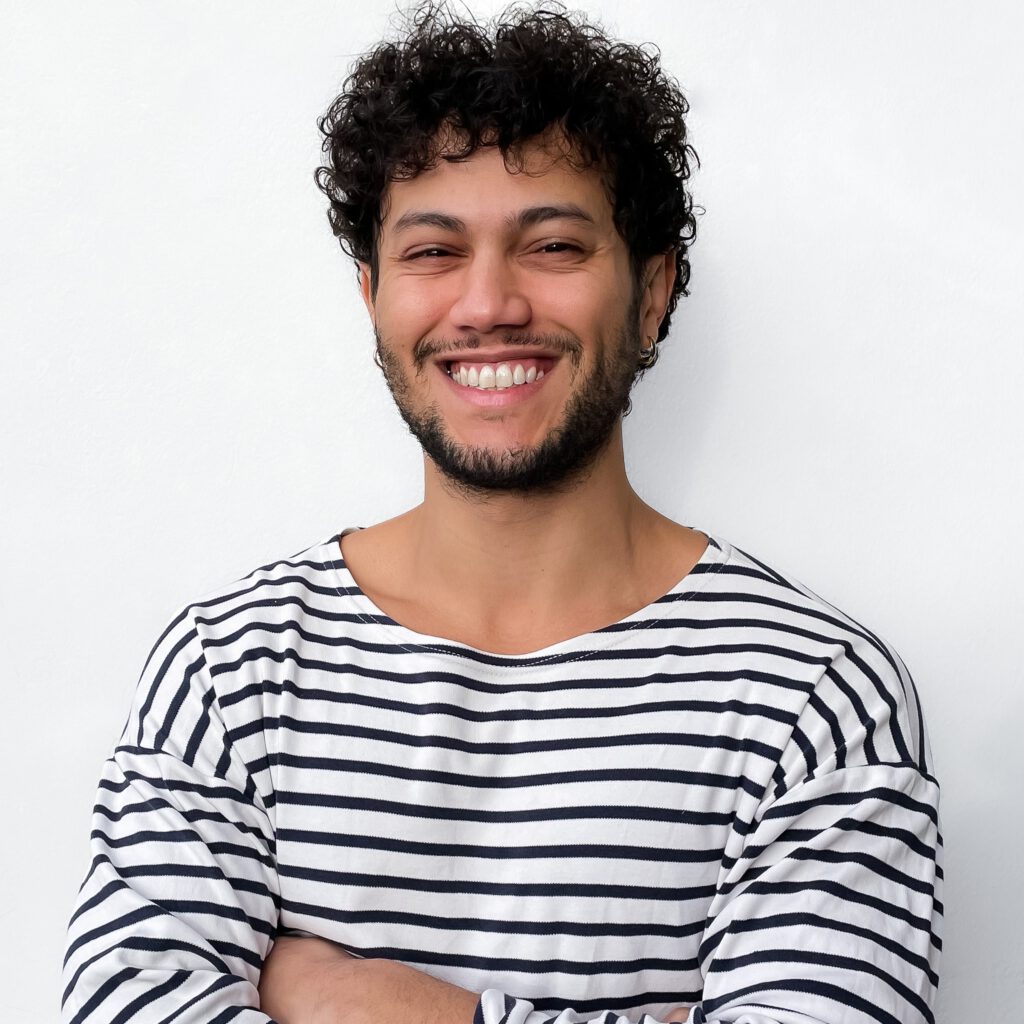
MYSTORY with …
Safir
31 Years, Berlin
“I forgot that I could afford flexibility,
experimentations and imperfections in my path;
that I could be living in intersections, in multitudes. …”
Published: December 2022
Identity Updates.
Quite recently, a friend of mine asked me over text: “Are you non-binary?”.
I laughed in front of my phone at first because to me, it was just the most obvious thing. My pronouns were displayed everywhere, from Instagram to Linked In, I would occasionally post the non-binary meme on Instagram, have my cute “they/them” in my work signature even; overally I live a pretty open life.
I also knew that this person didn’t mean any harm, the question came from a genuine place of interest and care. Yet, it remained hilarious to me because I realised one thing: I simply forgot to come out to her and despite all the signs, she actually wasn’t sure, because to her, I appeared to be a man.
I presented like a man, therefore I was one, right? I forgot that it was important to notify people of any “updates” on your gender, sexuality, religion, etc.
I got so used to displaying my identity that I eventually obliviated the fact that it needed updates once in a while and that it wasn’t in fact, so obvious. People had known me for years as Safir, Algerian, queer, gay, ex-Muslim, cisgender, able-bodied, immigrant, low-income, etc. Because it took me so many years to come to terms with how different I was going to be from everyone else in the world, I unconsciously “fixed” my identity the way some get fixed-term contracts.
I forgot that I could afford flexibility, experimentations and imperfections in my path; that I could be living in intersections, in multitudes.
There was no prerequisite for me to reduce who I was to fit any pre-created boxes.
As a result, my answer to the text was “Yes, I am. Let’s talk about it this weekend :)”. Following this exchange, I had to think about where I was at, as a person. Was I actually Algerian? Well, of course I was, but I had also figured out by now that I identified much better with my Amazigh and African roots overall than the regular national one.
Was I queer? This was pretty certain as well. Gay? Well this needed a bit of an update actually. I first came out as bisexual when I was 18 but people back then always told me I was gay so I accepted it as my fate without questioning it. Over 10 years later, I have to be clear about it: I am not gay. I am indeed closer to omnisexuality than to anything else but also accept to be called pansexual.
What about ex-Muslim? Tough one. I negated this part of me for such a long time because it felt like the part of me society hated the most (even more than my queerness, can you believe?). I can admit now that it was part of a very needed survival strategy to distance myself from how we were perceived worldwide. I was hoping it could offer me the chance to be treated better globally. In all honesty, years have taught me that no matter how far I stood from Muslim culture (from my culture) I would always and forever suffer from islamophobia so I could as well just embrace not only said heritage but also my faith. I also now try to approach Islam from an adult, non-judgmental perspective and I have to make a confession: there is some much beauty and peace in it.
Cisgender Safir? Well, this was a blatant lie. I always knew I didn’t fall under the binary-spectrum but lied to myself and to everyone else as it was too difficult to admit that I was going to “transgress” the common idea of what gender is, that most people wouldn’t ever understand it. It was such a liberating and joyful experience to talk to one of my best friends about it the first time. Their eyes opened and broadened with an incredible warmth. I told them gender to me was a construct I struggled to understand, that I neither felt like a man, nor like a woman; that I neither felt masculine, nor feminine; that I wasn’t feeling like a 50/50 but rather like none at all. While I understand how important gender is for some and respect it; I do not want gender to define me, I feel far from it, like it is of no importance to me. Today, I would call myself agender: a person who does actually not feel like they have a gender. My best friend received the news with a smile, a hug and a simple question: “Will you go by any specific pronoun from now on?”.
What about my non-disabled body? Up to now, I still agree with that statement but who knows what is going to happen in the future? I could write further about all the other sides of my identity, but I believe that by now, you get the image. Updates to me are necessary. Not only for others but mostly for yourself. As I regularly check myself up on how I feel within, I get to have a deeper understanding of who I am as an individual and as a part of my communities. There is so much power in knowledge.
Coming out for me was never (and won’t ever be) linear.
It still happens everyday: on Mondays about gender, on Wednesdays about sexuality. Most importantly, within me it changes every morning. Ever so slightly but with fluidity. Is my experience unique? Probably not. Is my experience universal, absolutely not! So should we expect anybody to live their experiences the same way we do? According to the Western ideology, it appears that everyone should come out.
Trust me, our sole experiences should never be made rules. Coming out is not obligatory. You can also live a beautiful, healthy and positive life without having to go through such intense momenta. Some of us won’t ever come out, and we shouldn’t police them. The way we embrace and empower ourselves, we should embrace and empower them in their own experiences as well.
DEAR Safir, Thank you very much for YourStory!
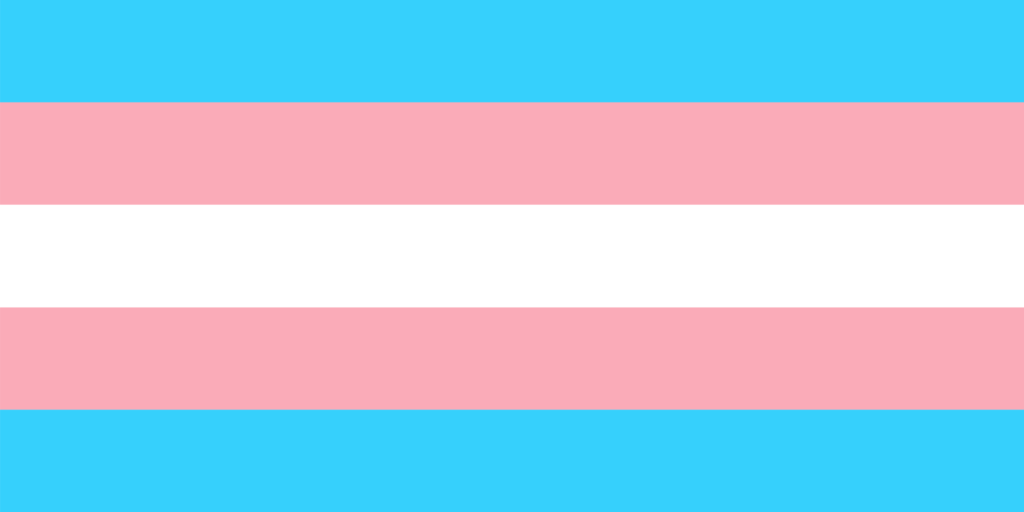
Self-determination instead of degradation!
The “Selbstbestimmungsgesetz” (law of self-determination) is supposed to put the 40 year old “Transsexuellengesetz” (law under which gender transitions are regulated) out of order.
This step is supposed to ensure that trans* people can change their gender without costly procedures, therapists and lots of paperwork.
Trans* inter* and non-binary people will need only to go to their local registry office and fill out a paper under oath to chance their gender.
there will also be a clause that protects trans* inter* and non-binary people from involuntarily being outed, or deadnamed.
It isnt clear yet if this law will be maintained in that way, or if more changes will be made in the end. At the end of the year it will once again be looked over by our politicans, before the law will have to go trough the usual parlamentary trials.
Of course we will keep you updated!
TIPS FOR TRANS* PEOPLE
Here at a glance is an excerpt on further assistance:
- Seek allies and role models within the company.
- If possible, work with the company to create a communication and action plan.
- Very important: You set the pace!
- Network with the LGBTIQ network, if one exists. We have compiled a list of LGBTIQ networks in companies and organizations.
TIPS FOR COMPANIES AND ALLIES
- A Transition Guide clearly specifies who is responsible. Note: the trans* person determines the pace and whether an action should be implemented. Every transition is individual
- Enable name and pronoun changes before the official decision is made.
- Training sensitize HR and management
- Establish and strengthen an internal LGBTIQ network with dedicated trans contact persons
- Inform about the topic trans*
- Use gender inclusive language, ask for a person’s pronouns so they use the one chosen by the trans* person and not their deadname. Deadname is the old, discarded name of a trans* person.
- Only ask questions that you would answer yourself
- Consciously stand up for the rights and against the discrimination of trans* persons
ADVICE CENTERS
BUNDESVERBAND TRANS*
“The Bundesverband Trans* (BVT) sees itself as a federation of individuals, groups, associations, federations and initiatives at regional, state and national level whose common endeavor is the commitment to gender diversity and self-determination and the commitment to human rights in terms of respect, recognition, equality, social participation and health of trans persons or persons not located in the binary gender system.”
DEUTSCHE GESELLSCHAFT FÜR TRANSIDENTITÄT UND INTERSEXUALITÄT E.V.
“The dgti has set itself the goal of promoting the acceptance of transidents within society and counteracting their stigmatization. It should advise and support those affected and interested, if this is desired. An essential aspect of the work should be the (re-)integration of affected persons into the work process, in order to counteract the danger of social decline, which is still associated with social change today. It advocates more openness to one’s own identity and takes into account the diversity of human existence.”
TRANSMANN E.V.
“Nationwide, volunteer-based, non-profit association for all woman-to-male (FzM/FtM) trans* and inter* people.”
TRANSINTERQUEER E.V.
“TrIQ is a social center and a politically, culturally and in the research field active association, which stands up for trans, intersex and queer living people in Berlin and beyond.”
TRANS*INTER*BERATUNGSSTELLE
“The project of the Münchner Aids-Hilfe e.V. is equally there for trans* and inter* people as well as their relatives and friends.”
TGEU
“TGEU is a membership-based organization that was founded in 2005. Since then, TGEU has steadily grown and established itself as a legitimate voice for the trans* community in Europe and Central Asia, with 157 member organizations in 47 different countries.”
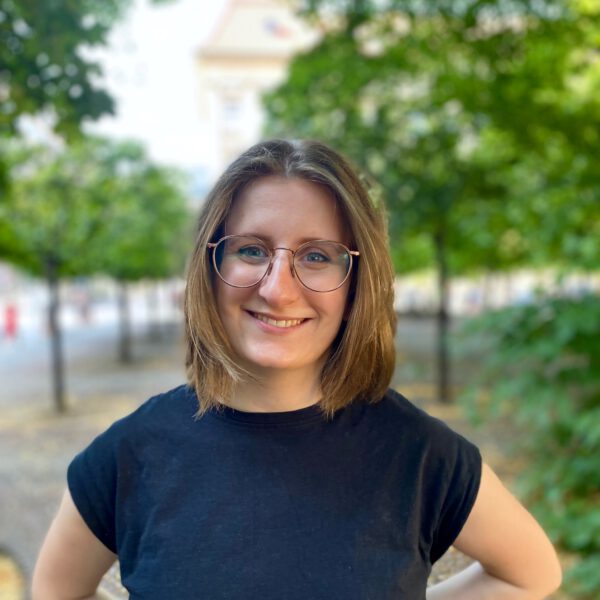
MYSTORY with …
RUTH
25 Years, Hamburg
“Despite, or because of the fact that I am hardly
affected by queer hostility, my experiences and
also those of others motivate me to publicly stand
up for education and rights of LGBTQ+ people…”
Published: September 2022
BI-Lieve in me.
For a long time, I considered it a privilege not to be seen as bisexual. It is both a curse and a blessing that on the one hand you experience less queer hostility on average if you live in a heterosexual partnership, for example – but on the other hand you don’t always experience full belonging to the LGBTQ+ community, or are too quickly labeled as either homosexual or heterosexual, depending on the partner at your side. Such experiences are, compared to the overall picture of queer discrimination, less bad and easy to cope with, whether in the political field, in private or in the professional environment, the latter being in my case the Shine network at PwC Germany.
Despite, or because of, the fact that I am hardly affected by queer hostility, my experiences and also those of others motivate me to publicly stand up for education and rights of LGBTQ+ people.
Pride Month is not only reserved for gays and lesbians – and society still has a long way to go in its development to not only think of the “L” and “G” in LGBTQ+ when it comes to queer topics, but to give all queer people the same treatment. Particularly issues away from the usual binary are still barely a concept for many, or are so foreign and incomprehensible that it’s easy to look away and associate queerness with tried-and-true queer role models, such as only gay men. However, the community is much more diverse and should be visible as a whole.
Admittedly, I also have to say that I personally find coming outs and labels to be incredibly oppressive and outdated at times. Along the lines of “why don’t straight people have to do that?” I sometimes think about, how unfair it is that queer people have to share something as personal as their sexuality publicly in order to avoid being looked at strangely because of their choice of partners. But I do recognize that this is still a very privileged point of view on my part.
Most people don’t have the luxury of such an open environment that any kind of queerness is immediately accepted without much fuss, while it should actually be self-evident nowadays. Unfortunately, however, past but also current events, such as the recent attack in Oslo, only emphasize repeatedly how important visibility of any kind is – and not only in June for Pride Month as a pinkwashing campaign of the mainstream corporations, but all year round without monetary consideration. Whether in the office, on the street or privately:
Visibility creates acceptance, dissolves long overdue norms and makes life easier especially for those who cannot (yet) live their queerness openly in fear of discrimination or hostility.
Therefore, I hope that the current social change will move steadily forward until no person has to live in fear because of his or her identity – which, in the best case, will not take too much longer.
DEAR Ruth, THANK YOU VERY MUCH FOR YOURSTORY!
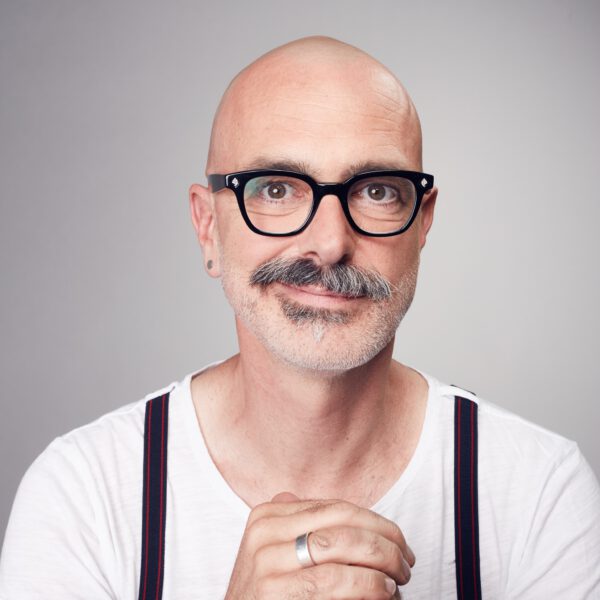
MYSTORY with …
Albert
51 Years, MUnich
“I go to work every day and
can say “I am what I am”! …”
Published: May 2022
The Walk.
I remember my school days very well. I grew up in a very Catholic environment. Catholic convent school. Early 80’s. In 7th and 8th grade, puberty in full swing. At the same time, HIV/AIDS was big in the headlines. All anyone knew at the time was that you were going to die from it. And so I was shaped – there was a right and a wrong. Gay = AIDS = wrong.
It wasn’t until much later that it became clear to me that I was gay. I only came out during my studies. After my pre-studies I went to Wales for a Master’s program. What a good opportunity to discover my sexual orientation. In this discovery process, I immediately had to experience a young gay man being rushed through the place. Again, it was burned into me: gay = wrong.
But, I dared. Then in London, after my studies, I experienced a cosmopolitan city, with gay bars that had shop windows. Anyone could look in. What a liberating feeling. Then, back in my hometown of Augsburg, I experienced a completely different scene: I had to ring the bell to be let in. The windows were taped up so that no one would see us.
But I didn’t let it get me down now, because I knew London. Took part in the very first CSD in Augsburg and felt super proud alongside 20 other people.
My professional life started with the usual “cost of thinking twice”. At that time I was not aware of it, because my learned formula was “gay = wrong”, so why tell about it at work. I was just with a friend or with friends on the road, there was nothing more private from me. Until a friend told me on a hike with the Gay Outdoor Club that he was completely out at BCG, that they have a network and make things happen. And of course he knew a gay guy at IBM, my employer at the time. He wrote him directly that there was a colleague at IBM who would support a network. It wasn’t 48 hours before his email was forwarded from the gay guy in Miami to a gay guy in London, who, Ken was his name, called me.
To this day, Ken only knows rainbow colourful, there is no backing out for the community for him. His first question was: “Are you out? If yes, I can make you attend the next LGBT leadership conference at IBM New York next week.” Of course, I was not outed, and thus the trip to New York was passé. But within the next week, I outed myself to my boss and my journey on LGBTIQ in the workplace began. I founded the LGBTIQ network at IBM Germany, got involved with the issue on a European level within the company, and got the first job in Europe in IBM’s sales department as a so-called “GLBT Business Development Executive”.
In all that time, I have had to listen to really stupid comments from time to time, some of which left me speechless, but I have never experienced any real discrimination. The support I experienced from the Out Executives at IBM built self-confidence in me, so that today I represent the topic without fear. Through the various roles I have held to date, I have been able to meet Out personalities, as well as Allies, who have inspired me and continue to drive me to continue with my advocacy. PROUT AT WORK has become the platform for that, Jean-Luc my partner in crime. Together we came up with such great ideas, encouraged each other that PROUT AT WORK is what it is today. And I go to work motivated every day and can say “I am what I am”. Thank you to everyone who has helped me become who I am.
DEAR Albert, THANK YOU VERY MUCH FOR YOURSTORY!
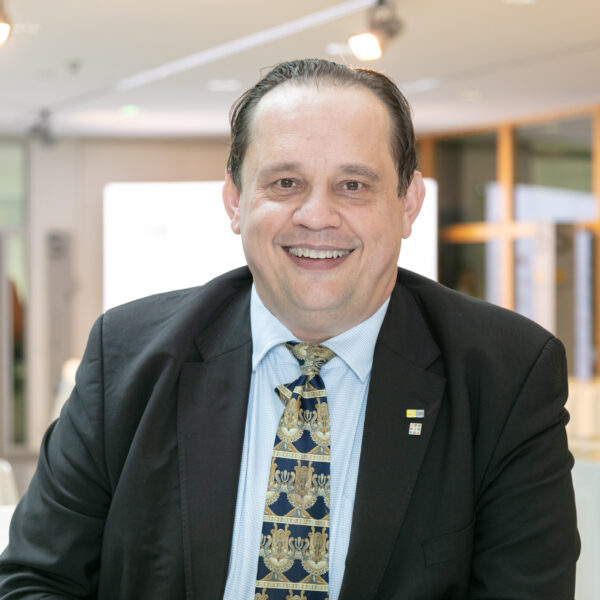
MYSTORY With …
Jean-Luc
55 Years, Frankfurt
“My parents and grandparents taught me that
belonging to a minority has a positive value
and is something to be proud of. …”
Published: May 2022
The Power of rooTs.
For me and my involvement in the LGBT*IQ community, my roots and my origin are very important . Since birth, I belong to a minority in France, as a Protestant in a very Catholic country. We Protestants represent about 2 million citizens, less than 3% of the French population. We are a strong community, very involved in society, politics, associations and economy.
My parents and grandparents taught me that belonging to a minority has a positive value and is something to be proud of. I also learned as a child that solidarity within and outside one’s community is essential – and that one should help others who are suffering or rejected, no matter who they are.
Protestants have also been discriminated against in the past, especially in the 17th/18th centuries, just because of their faith. My family experienced this discrimination just like other Protestant families. For example, we were not allowed to bury our dead in the cemetery in the past, so every Protestant family had a small cemetery on their property. From such experiences, we know what discrimination feels like – and that explains why we Protestants helped many Jews during World War II, for example. So I learned that I have to stand up against any kind of discrimination in the whole society.
For generations, members of my family have been involved in the church and in local politics, for example. In the Lutheran Church, church affairs are decided and administered by a synod, a group of people made up of 50% clergy and 50% church members. My father was a member of our church’s synod for over 20 years. My parents and grandparents were also very active in the unions. And I am the first in my family to help start a foundation, which they are very proud of.
I saw from a young age how important and rewarding it is to be socially involved, to have time for others, and that it is possible to make positive changes.
… About 23/24 years ago, I had my Coming Out and met the first big love of my life. This gave me a lot of strength and self-esteem, which brought about many changes in my life. I left the university world to start my career at Deutsche Bank – and also my social commitment.
Then, in 2000, I was lucky enough to be invited to the founding event of dbPride, Deutsche Bank’s LGBT*IQ network – that was the beginning of everything!!!
From the beginning, more than 20 years ago, until today, my upbringing and roots have been the key and main driving force for my commitment to the LGBT*IQ community – and beyond … for a more respectful and tolerant society.
Dear JEan-Luc, Thank you very much for YourStory!
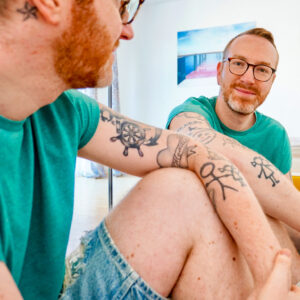
MYSTORY With …
torsten
39 Years, hamburg
“When I look at my life, I am happy.
Happy because it is so wonderfully normal. And that
is not a matter of course.”
Published: May 2022
A completely normal life.
I am aware that there are still many problems in the world and that we are far from reaching our goal. Many generations have already fought and many generations will still have to fight for it.
When I look at my life, I am happy. Happy because it is so wonderfully normal. And that is not a matter of course. I feel I’ve arrived and want to look positively at how far we’ve already come.
I have been living with my partner for 17 years, in 2011 we established our civil partnership and in 2018 we finally got married. Each of these events was a celebration with many friends and with the whole family.
In all this time and even before that, I did not have to experience any discrimination (at least not consciously) and no obstacles were put in my or our way.
There were never any problems getting an apartment. At no workplace did I ever have to discuss my sexual orientation or even hide it.Family and friends have always accepted my life model and never questioned it, rather supported it. There are other queer family members and happy children in their relationships. The circle of friends is mixed (various nationalities, sexual orientation, HIV-positive/negative, men and women) and together we enjoy life. Whether at home, in bars, restaurants, at events, on vacation and whatever else, we openly and visibly participate in life in society. And the best part is, most of the time I don’t even waste a thought on whether we might not be “normal”. It just doesn’t matter as long as we are doing well and feel comfortable and safe.
My most beautiful experience, which reflects all this, is the acquisition of our wonderful allotment garden. The day we introduced ourselves to the allotment board, we simply received the Nordic dry comment:
“Are you brothers, friends or a couple? Oh never mind, we already have all constellations here. Welcome to the club.”
It’s just a normal life in the best, most positive sense.
I wish that at some point we would no longer have to worry about who we are, what we do and where we come from. No one should have to justify themselves or take a back seat. It should no longer be necessary to have debates in the future. It should simply no longer be an issue, but a matter of course.
I wish that every person can live their normal life.
Dear Torsten, thank you very much for YourStory!
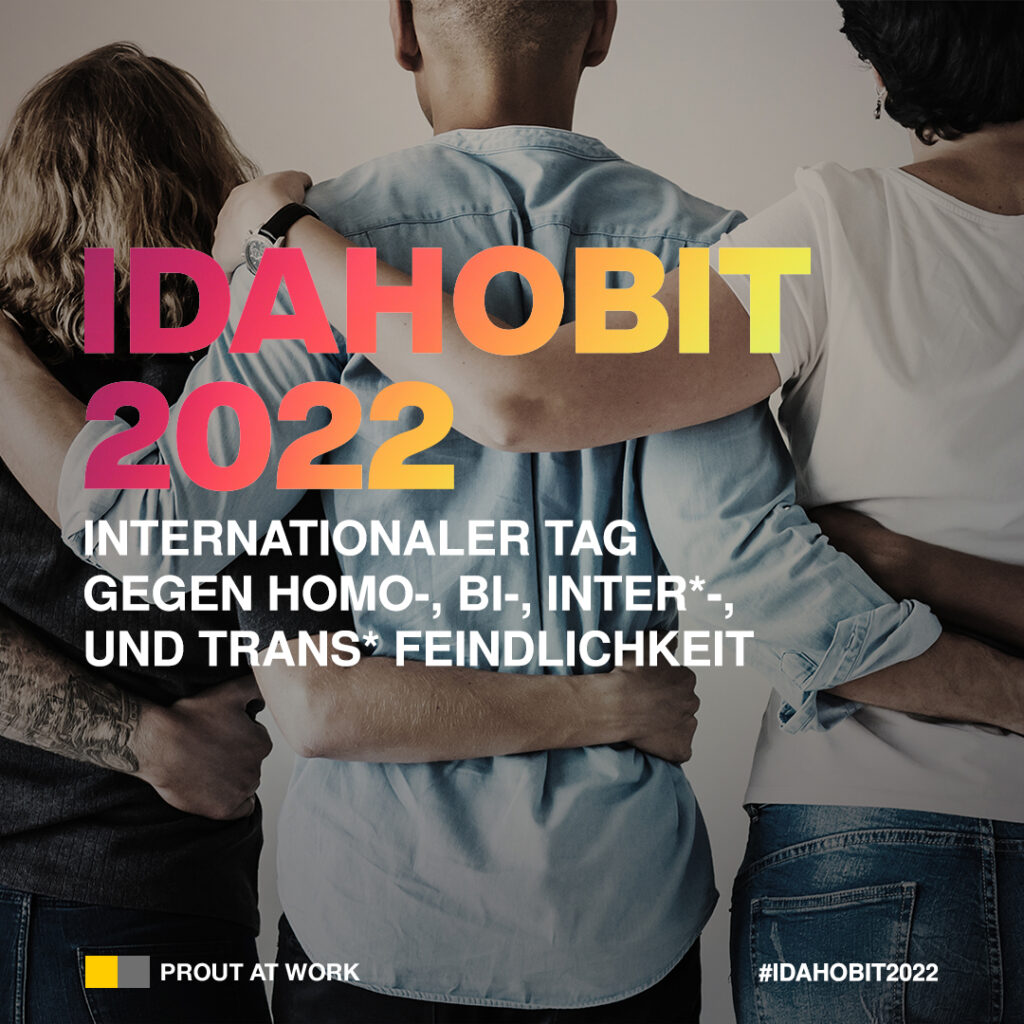
This Year’s IDAHOBIT and #MyStory
The International Day against Homophobia, Bi-, Inter- and Transphobia (IDAHOBIT) has been celebrated annually on May 17 since 2005 to highlight discrimination against the LGBT*IQ community, to raise awareness of existing inequality structures and to take a united stand for diversity and tolerance. May 17 marks the day in 1990 when the WHO removed homosexuality from the diagnostic code for diseases.
Today and every day of the year, we want to celebrate the colorful diversity of the LGBT*IQ community and have therefore created the format “MyStory”. The format gives a stage to all the individual stories that queer people experience every day, because we believe that everyone has something inspiring to tell. We start today with four moving stories.
IDAHOBIT 2022
Facts
Studies show that workplace discrimination experiences are still part of everyday life for many LGBT*IQ people. The study “Inter in the Office?!” The work situation of inter* people in Germany under a differential perspective to (endo) LGBTQ+ people.”, published in 2020 by Prof. Dr. Dominic Frohn states that 37.7% of (endo) trans and/or non-binary people surveyed, approx. 30% of inter* respondents and approx. 20& of (endo* cis) LGB+ people directly experience workplace discrimination , in the form of e.g. job rejection, transfer or dismissal.
It’s not surprising, then, that according to a Boston Consulting Group survey (2018/19), 22% of respondents see coming out at work as a potential career risk. 42% would lie to their manager about their sexual orientation and/or gender identity. More background information and studies on LGBT*IQ (in the workplace).
Support
Discrimination against LGBTIQ people is evident at other levels of society besides the workplace. Deal with these issues and make yourself aware of existing inequality structures. Only by becoming aware of these structures and grievances can you actively contribute to their dismantling. The points mentioned here are only an excerpt and not a complete list of possibilities with which you can start your commitment for LGBTIQ equal opportunities and against homophobia, bi-, inter- and transphobia.
Blood Donation
Discrimination against LGBT*IQ people is evident at other levels of society besides the workplace. Deal with these issues and make yourself aware of existing inequality structures. Only by becoming aware of these structures one can actively contribute to their dismantling. The points mentioned here are only an excerpt and not a complete list of possibilities with which you can start your commitment for LGBT*IQ equal opportunities and against homophobia, bi-, inter*- and trans*phobia.
EU LGBT*IQ Freedom Zone
In 2020, some Polish municipalities and cities declared their region as so-called “LGBT-free zones”. The establishment of entire regions where, according to the signatories, no LGBT*IQ people live is a clear attack on lesbian, gay, bisexual, trans and inter* people. As a first step, the European Parliament has declared the EU as an “LGBTIQ Freedom Zone” to send a clear message against the homophobic rhetoric and sentiment against sexual minorities in Poland. Find out more about the current events in this regard.
Selbstbestimmungsgesetz
The currently valid “Transsexuellengesetz” (TSG) is deeply discriminatory and should be replaced by the self-determination law. “The parliamentary group Bündnis 90/Die Grünen has submitted a bill “for the repeal of the transsexual law and introduction of the self-determination law” (19/19755)”.
A basic Law for all
Demand the addition of Article 3 GG, because LGBT*IQ people are still not protected by Article 3 in the German Basic Law. Many people within the LGBT*IQ community experience discrimination, exclusion and hate violence. We feel that a protection by the Basic Law is indispensable and therefore PROUT AT WORK is one of the first signatories of the appeal “A Basic Law for All”. Sign also now the petition or contact your delegates.
Legal Equality for queer Families
Stand up for the rights of rainbow families. Compared to children of heterosexual couples, the second mother must first adopt her child to provide legal protection – even if the parents are married. For example, support the nodoption campaign, which opposes stepchild adoption among rainbow families and advocates for recognition of parenthood.
MyStory
We collect stories that move, entertain, inspire. Read our first four stories today and look forward to many more!
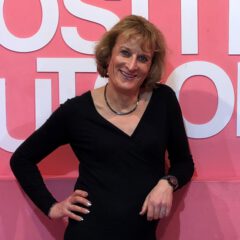
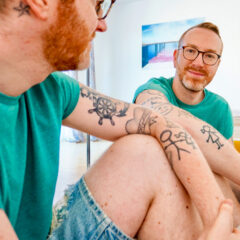
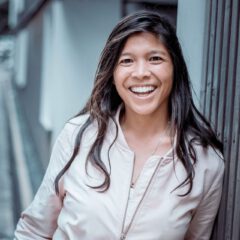
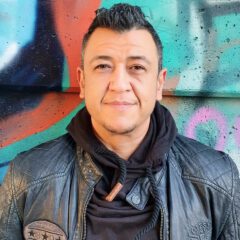
Counseling
LesMigras
LesMigraS is the anti-discrimination and anti-violence section of lesbian counseling Berlin e.V.”
Gladt e.v.
“GLADT is a self-organization of black and of color lesbians, gays, bisexuals, trans, inter and queer people in Berlin, which stands up against racism, sexism, trans* and homophobia, ableism and other forms of discrimination and offers a diverse range of counseling services.”
Antidiskriminierungsstelle des Bundes
“The counseling team with lawyers can inform you about your rights in a case of discrimination or sexual harassment, show you possibilities if and how you can enforce your rights, strive for an amicable conflict resolution and try to name experts close to your home.”
Bundesverband trans*
“The Bundesverband Trans* (BVT) sees itself as an association of individuals, groups, clubs, associations and initiatives at regional, state and national level, whose common endeavor is the commitment to gender diversity and self-determination and the commitment to human rights in terms of respect, recognition, equality, social participation and health of trans or persons not located in the binary gender system.”
Deutsche Gesellschaft für Transidentität und Intersexualität e.V.
“The dgti has set itself the goal of promoting the acceptance of transidents within society and counteracting their stigmatization. It should advise and support affected and interested persons, if this is desired. An essential aspect of the work should be the (re-)integration of affected persons into the work process, in order to counteract the danger of social decline, which is still associated with social change today. It advocates more openness toward one’s own identity and takes into account the diversity of human existence.”
